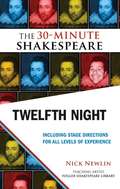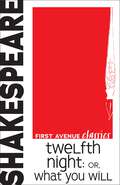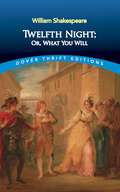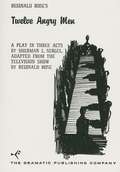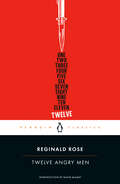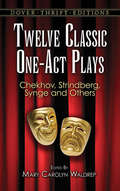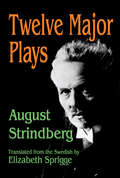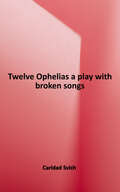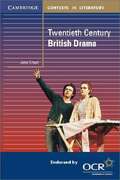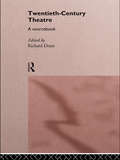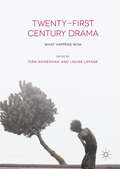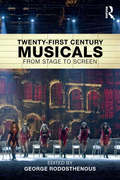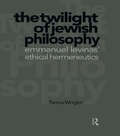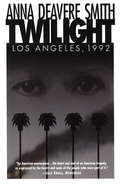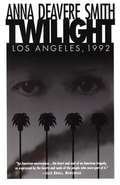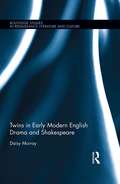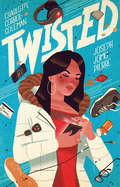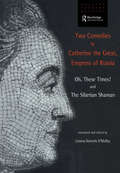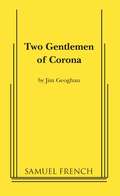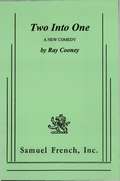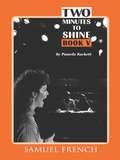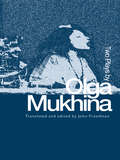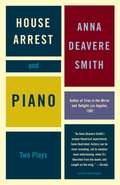- Table View
- List View
Twelfth Night: The 30-Minute Shakespeare
by Nick NewlinPlanning a school or amateur Shakespeare production? The best way to experience the plays is to perform them, but getting started can be a challenge: The complete plays are too long and complex, while scene selections or simplified language are too limited."The 30-Minute Shakespeare" is a new series of abridgements that tell the "story" of each play from start to finish while keeping the beauty of Shakespeare's language intact. Specific stage directions and character suggestions give even inexperienced actors the tools to perform Shakespeare with confidence, understanding, and fun!This cutting of TWELFTH NIGHT, Shakespeare's bittersweet comic masterpiece, consists of three classic scenes. After an extended introductory narration, the action begins with Feste the Fool consoling a mourning Lady Olivia with wit and wordplay. Viola (disguised as a male Cesario) woos Olivia on behalf of Duke Orsino, but Olivia falls for the messenger Viola/Cesario instead. The final scene in Olivia's kitchen gives young actors an easy and specific way to play late-night revelry, as Sir Toby Belch and his friends amuse themselves with the censorious but ultimately hapless Malvolio. One highlight of the production is a group "rap" version of the song "Come Away Death."The edition also includes an essay by editor Nick Newlin on how to produce a Shakespeare play with novice actors, and notes about the original production of this abridgement at the Folger Shakespeare Library's annual Student Shakespeare Festival.
Twelfth Night: or, What You Will (First Avenue Classics ™)
by William ShakespeareIn the kingdom of Illyria, a love triangle has everyone on edge. Orsino loves Olivia, a bereaved noblewoman who is in mourning for her dead brother. Olivia loves Cesario, who is actually a woman named Viola. Viola had dressed as a man in order to gain employment in Orsino's household. Viola, of course, falls in love with Orsino, and he has no knowledge of the true identity of his "male" servant, Cesario. A romantic romp full of tricks, twists, and happy reunions, this unabridged version of William Shakespeare's classic comedy was first published in England in 1623.
Twelfth Night; Or, What You Will: A Comedy In Five Acts (classic Reprint) (Dover Thrift Editions: Plays)
by William ShakespeareA delightfully comic tale of mistaken identities, Twelfth Night revolves around the physical likeness between Sebastian and his twin sister, Viola, each of whom, when separated after a shipwreck, believes the other to be dead. The theatrical romp begins when Viola assumes the identity of Cesario, a page in the household of the Duke of Orsino. The Duke is enamored of the Countess Olivia, who spurns him for the newly arrived young page. The comical machinations of Malvolio, Sir Toby Belch, the maid Maria, and Sir Andrew Aguecheek add to the ensuing confusion -- all of which is pleasantly resolved when Viola and Sebastian meet once again. Filled with some of the finest comedic scenes in the English language, this entertaining masterpiece remains one of Shakespeare's most popular and most performed comedies.
Twelve Angry Men (A Play in Three Acts)
by Reginald Rose Sherman SergelTwelve Angry Men holds at its core a deeply patriotic belief in the U.S. legal system. The storyà Â's focal point, known only as Juror Eight, is at first the sole holdout in an 11-1 guilty vote. Eight sets his sights not on proving the other jurors wrong but rather on getting them to look at the situation in a clear-eyed way not affected by their personal biases. Rose deliberately and carefully peels away the layers of artifice from the men and allows a fuller picture of America, at its best and worst, to form.
Twelve Angry Men: A Screen Adaptation, Directed By Sidney Lumet (Student Editions Ser.)
by Reginald RoseThe Penguin Classics debut that inspired a classic film and a current Broadway revival Reginald Rose's landmark American drama was a critically acclaimed teleplay, and went on to become a cinematic masterpiece in 1957 starring Henry Fonda, for which Rose wrote the adaptation. A blistering character study and an examination of the American melting pot and the judicial system that keeps it in check, Twelve Angry Men holds at its core a deeply patriotic belief in the U. S. legal system. The story's focal point, known only as Juror Eight, is at first the sole holdout in an 11-1 guilty vote. Eight sets his sights not on proving the other jurors wrong but rather on getting them to look at the situation in a clear-eyed way not affected by their personal biases. Rose deliberately and carefully peels away the layers of artifice from the men and allows a fuller picture of America, at its best and worst, to form. .
Twelve Classic One-Act Plays
by Mary Carolyn WaldrepFrom high school drama students to community theater actors, performers everywhere are looking for inexpensive material to entertain audiences. This collection of a dozen royalty-free, one-act plays provides the perfect solution. Classic dramas include Aristophanes' The Birds, J. M. Synge's Riders to the Sea, and Eugene O'Neill's The Moon of the Caribbees. Other works include August Strindberg's The Stronger, Susan Glaspell's Trifles, Louise Saunders' The Knave of Hearts, and Oscar Wilde's A Florentine Tragedy, in addition to plays by Molière, Anton Chekhov, William Butler Yeats, James M. Barrie, and Edna St. Vincent Millay.
Twelve Major Plays
by August StrindbergAugust Strindberg is one of the founders of the modern theater. George Bernard Shaw considered him "the only genuinely Shakespearian modern dramatist," Sean O'Casey called him "the greatest of them all." And to Eugene O'Neill he was "the greatest interpreter in the theater of the characteristic spiritual conflicts of our lives today." Twelve Major Plays includes the most famous and most characteristic Strindberg plays.This selection is particularly interesting in its depiction of the great range of Strindberg's moods and styles, from naturalism to expressionism, from ironic comedy to bitter tragedy. It displays his great gift for symbolic, mystical verse as well as his command of dramatic prose. In issues of sex and gender, Strindberg anticipated the modern temperament in society and drama alike.These translations gave American readers their first opportunity to know the true genius of Strindberg. Most previous versions in English had been based on existing German translations. Elizabeth Sprigge's unique achievement was to render the original Swedish texts into English that is at once fluent and accurate and that captures the full vigor and impact of the original plays.
Twelve Ophelias (a Play With Broken Songs)
by Caridad SvichIn Caridad Svich's play with songs TWELVE OPHELIAS, Shakespeare's Ophelia rises out of the water dreaming of Pop-Tarts and other sweet things. She finds herself in a neo-Elizabethan Appalachian setting where Gertrude runs a brothel, Hamlet is called a Rude Boy, and nothing is what it seems. In this mirrored world of word scraps and cold sex, Ophelia cuts a new path for herself.
Twentieth Century British Drama
by John SmartCritical introductions to a range of literary topics and genres. Looking back on 20th century British drama from its' historical, social and political perspective enables the reader to set each play in a broader context. Contents include a selection of play extracts from well-known authors including Harold Brighouse, John Osborne, Harold Pinter, Tom Stoppard and Timberlake Wertenbaker.
Twentieth Century Theatre: A Sourcebook
by Richard DrainTwentieth Century Theatre: A Sourcebook is an inspired handbook of ideas and arguments on theatre. Richard Drain gathers together a uniquely wide-ranging selection of original writings on theatre by its most creative practitioners - directors, playwrights, performers and designers, from Jarry to Grotowski and Craig. These key texts span the twentieth century, from the onset of modernism to the present, providing direct access to the thinking behind much of the most stimulating theatre the century has had to offer, as well as guidelines to its present most adventurous developments. Setting theory beside practice, these writings bring alive a number of vital and continuing concerns, each of which is given full scope in five sections which explore the Modernist, Political, Inner and Global dimensions of twentieth century theatre. Twentieth Century Theatre: A Sourcebook provides illuminationg perspectives on past history, and throws fresh light on the sources and development of theatre today. This sourcebook is not only an essential and versatile collection for students at all levels, but also directed numerous devised shows which have toured to theatres, schools, community centres and prisons.
Twenty-First Century Drama
by Siân Adiseshiah Louise LepageWithin this landmark collection, originalvoices from the field of drama provide rich analysis of a selection of the mostexciting and remarkable plays and productions of the twenty-first century. But what makes the drama of the new millenium so distinctive? Which events, themes, shifts, and paradigms are marking its stages? Kaleidoscopic in scope, Twenty-FirstCentury Drama: What Happens Now creates a broad, rigorously criticalframework for approaching the drama of this period, including its forms,playwrights, companies, institutions, collaborative projects, and directors. The collection has a deliberately British bent,examiningestablished playwrights - such as Churchill, Brenton, and Hare - alongside anew generation of writers - including Stephens, Prebble, Kirkwood, Bartlett,and Kelly. Simultaneously international in scope, it engages with significant new work from the US,Japan, India, Australia, and the Netherlands, to reflect atwenty-first century context that is fundamentally globalized. The volume'scentral themes - the financial crisis, austerity, climate change, new forms ofhuman being, migration, class, race and gender, cultural politics and issues ofnationhood - are mediated through fresh, cutting-edge perspectives.
Twenty-First Century Musicals: From Stage to Screen
by George RodosthenousTwenty-First Century Musicals stakes a place for the musical in today’s cinematic landscape, taking a look at leading contemporary shows from their stage origins to their big-screen adaptations. Each chapter offers a new perspective on a single musical, challenging populist narratives and exploring underlying narratives and sub-texts in depth. Themes of national identity; race, class and gender; the ‘voice’ and ‘singing live’ on film; authenticity; camp sensibilities; and the celebration of failure are addressed in a series of questions including: How does the film adaptation provide a different viewing experience from the stage version? What themes are highlighted in the film adaptation? What does the new casting bring to the work? Do camera angles dictate a different reading from the stage version? What is lost/gained in the process of adaptation to film? Re-interpreting the contemporary film musical as a compelling art form, Twenty-First Century Musicals is a must-read for any student or scholar keen to broaden their understanding of musical performance.
Twilight of Jewish Philosophy
by Wright Dr Tamra WrightFirst Published in 1999. Routledge is an imprint of Taylor & Francis, an informa company.
Twilight: Los Angeles 1992
by Anna Deavere SmithAnna Deavere Smith's stunning new work of "documentary theater" in which she uses verbatim the words of people who experienced the Los Angeles riots to expose and explore the devastating human impact of that event.
Twilight: Los Angeles, 1992
by Anna Deavere SmithAnna Deavere Smith's stunning new work of "documentary theater" in which she uses verbatim the words of people who experienced the Los Angeles riots to expose and explore the devastating human impact of that event.
Twins in Early Modern English Drama and Shakespeare (Routledge Studies in Renaissance Literature and Culture)
by Daisy MurrayThis volume investigates the early modern understanding of twinship through new readings of plays, informed by discussions of twins appearing in such literature as anatomy tracts, midwifery manuals, monstrous birth broadsides, and chapbooks. The book contextualizes such dramatic representations of twinship, investigating contemporary discussions about twins in medical and popular literature and how such dialogues resonate with the twin characters appearing on the early modern stage. Garofalo demonstrates that, in this period, twin births were viewed as biologically aberrant and, because of this classification, authors frequently attempt to explain the phenomenon in ways which call into question the moral and constitutional standing of both the parents and the twins themselves. In line with current critical studies on pregnancy and the female body, discussions of twin births reveal a distrust of the mother and the processes surrounding twin conception; however, a corresponding suspicion of twins also emerges, which monstrous birth pamphlets exemplify. This book analyzes the representation of twins in early modern drama in light of this information, moving from tragedies through to comedies. This progression demonstrates how the dramatic potential inherent in the early modern understanding of twinship is capitalized on by playwrights, as negative ideas about twins can be seen transitioning into tragic and tragicomic depictions of twinship. However, by building toward a positive, comic representation of twins, the work additionally suggests an alternate interpretation of twinship in this period, which appreciates and celebrates twins because of their difference. The volume will be of interest to those studying Shakespeare and Renaissance Literature in relation to the History of Emotions, the Body, and the Medical Humanities.
Twisted
by Joseph Jomo Pierre Charlotte Corbeil-ColemanGrowing up, Nancy believed in magic despite a hand-me-down life in a small town. So it’s no wonder the buzzing excitement of Toronto and its allure of freedom was a likely choice for her new home, the place she finds herself years later selling her body for drugs. Nancy is further from freedom than ever under the wings of Sikes, a drug dealer and pimp. When she meets Oliver, a seventeen-year-old who lands at Sikes’s feet after a life of foster care and shelters, the two find unlikely solace in each other. As text messages are exchanged by the instant, and truths are revealed, Nancy and Oliver form an unbreakable bond in order to write a new story together.
Two Comedies by Catherine the Great, Empress of Russia: Oh, These Times! and The Siberian Shaman
by Lurana Donnels O'MalleyCatherine the Great (1729-1796) wrote over two dozen plays and operettas, but not until this edition has a complete translation of any of them been available to an English- speaking readership. Oh, These Times (1772) is a satirical attack on many vices Catherine wished to root out from her society: religious hypocrisy, superstition and slander. The main character, Mrs. Pious, is a superficially religious old woman who resembles Moliere's Tartuffe. Catherine again sets her sights on superstition in The Siberian Shaman (1786), this time by satirizing shamanism as a deceitful profession which preys on the gullible. This play was part of a group of three plays usually known as Catherine's "anti-masonic" trilogy, written as a warning against the growing influence of the freemasons. In a comprehensive introduction, Lurana Donnels O'Malley relates the plays to Catherine's status and philosophy.
Two Gentlemen of Corona
by Jim GeoghanComedy / Characters: 5m, 1f / In this world-premiere comedy, it's 1963 and Joey and Carmine are low-level soldiers in the New York mob. Joey services juke boxes and vending machines...Carmine makes two runs a week to South Carolina for illegal cigarettes. But things are looking up for the pair. The 1964 World's Fair is just around the corner and these Two Gentlemen of Corona are plotting to help their boss, John, swindle thousands of foreign tourists. It looks like nothing can stand in their way...oh, except for the fact that Joey is falling in love with his boss's mistress! This comedy is the perfect light-hearted fare: refreshing and funny, with just a touch of heart. "Geoghan gives a sweetly retro twist to Gentlemen, keeping his comic archetypes so anchored in reality that they elicit sympathy as well as laughter." -Los Angeles Times "A comedy with hysterical lines, historical intrigue, and a happy ending for the young lovers." -EyeSpy LA
Two Into One
by Ray CooneyFarce / 5m, 5f, plus extras / 3 Interiors / Mr. Cooney is truly the leading contemporary practitioner of a great theatrical tradition the sex farce. Two Into One is about nothing more than the hilarious attempts of a Member of Parliament to arrange a dalliance with a secretary for the P.M. in an out of the way little hotel. Unfortunately, he engages one of his aides to arrange the whole thing. The aide is something of a charming bumbler and he gets everything all mixed up. Also on hand are the pompously disapproving hotel manager, a venal ethnic waiter and a female Labour politician who crusades against pornography on the one hand, while on the other she is trying to lure the bumbling civil servant into bed!
Two Minutes to Shine - Book 5
by Pamela SackettThe latest in the popular monologue series, these monologues run the gamut, from broken-hearted boyfriends, to job interviews gone wrong, to frustrated mothers and revengeful sisters. Includes monologues for men and women. Perfect for auditions.
Two Plays by Olga Mukhina (Russian Theatre Archive Ser. #Vol. 18)
by John FreedmanOlga Mukhina is one of the most talented, young playwrights in Russia. Born in Moscow in 1970, she has already garnered enviable praise from critics and audiences throughout Russia and Europe since her first play, Tanya-Tanya, was performed in 1996. Tanya-Tanya is an atmospheric, poetic tale that observes three couples at a suburban Moscow home who dance, drink champagne, kiss, fall in and out of love, and struggle with dignity and humor to keep some semblance of control over their lives. The parallels with Chekhovian drama are undeniable and clearly intended by the author. You, Mukhina's most recent work, is a love poem to her hometown of Moscow as well as a scathing attack on the apathy of people blindly wrapped up in their own happiness and sorrow.
Two Plays: House Arrest and Piano
by Anna Deavere SmithHouse Arrest describes the relations between a series of American presidents and their observers in and out of the press. Piano casts a gaze a century behind as she follows the tangled line of exploitation in Cuba at Spanish-American War.
